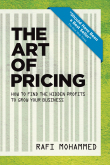Do Discounts Really Promote Repeat Business?
If I had a dollar for every time someone opined to me, “offering a discount will get people in the door, they’ll love the product (or service), and they’ll return as full paying customers,” I’d be a very wealthy man - living in the Caribbean, fruity drink in hand.
I just don’t believe it…okay, maybe under certain conditions I do, but I’ll get to that in a minute.
Consider the following example. A noted upscale restaurant in your town offers a 50% off discount coupon on a web site such as Groupon. You “bite” and enjoy the restaurant – are you really going to return and pay full price? That fancy chicken dish that you happily paid $13.50 for (with the discount) now will cost $27. I wouldn’t return at full price – I’d check out the $27 chicken dishes at another fancy restaurant. For products with high subjective value (i.e., branded, upscale), I believe that a discount destroys value and it will be a challenge to convert consumers attracted by a big discount to pony up full price in the future.
A 50% discount is less damaging for products that provide more objective value. Suppose the entrepreneurial kid next door offers you a 50% off one time “try me” coupon on his lawn mowing service. Scheduling his second visit, he reminds you that instead of the $20 you paid with the coupon, you will now have to pay the full $40 price. Given that the service offers objective value (I’ll have to mow myself in 90 degree heat if I don’t hire someone) and rivals are offering similar prices – I doubt that a trial discount will adversely affect this service’s perceived value.
So what about the age old practice of Sunday newspaper coupons? I believe that offering low discounts (say, under 20%) on products that primarily provide objective value is a savvy pricing strategy. The discount is not large enough to cause customers (both current and prospective) to question the product’s value. With value in tact, discounts can inspire trial which may lead to future full price purchases as well as hook price sensitive customers who only buy when on sale (which is okay).
Controversial topic I know…so please take the time to share your comments.
My sincere thanks to Ivana Taylor for her strong review of The 1% Windfall in Small Business Trends.
Readers' Comments on This Blog Entry
By objective, I mean that the value is clearly quantifiable - a dishwasher, a basic lawn mower, etc. Subjective value is more about psychological value premiums - the value of a brand (it'd look bad if Jimmy Choo discounted its prices by 50%) etc.
Rafi, I agree with your perspective, customers rarely return to 50% type offers unless the value they gain from the discount exceeds the value of that discount.
I agree, discounting, in almost all circumstances will destroy the profits of a small business, and therfore should be avoided at all costs. Business owners should be encouraged to compete on terms other than price. If your competitor is undercutting your price highlight your better customer service, stronger guarantee, better after sales service, superior product knowledge, cleanliness, on time delivery, or a host of other features associated with your product or service, real or perceived. Rafi, several months ago I was critical of an article you wrote supporting or encouraging a discounting policy to win new business. On this occasion I am pleased to be able to agree with you. Too often I see business owners throw away profit through discounting their price in the mistaken belief it is the right thing to do for the business in the long run.





Can you expand on your definition of "objective" products? I'm trying to draw a clearer distinction between objective and subjective products.